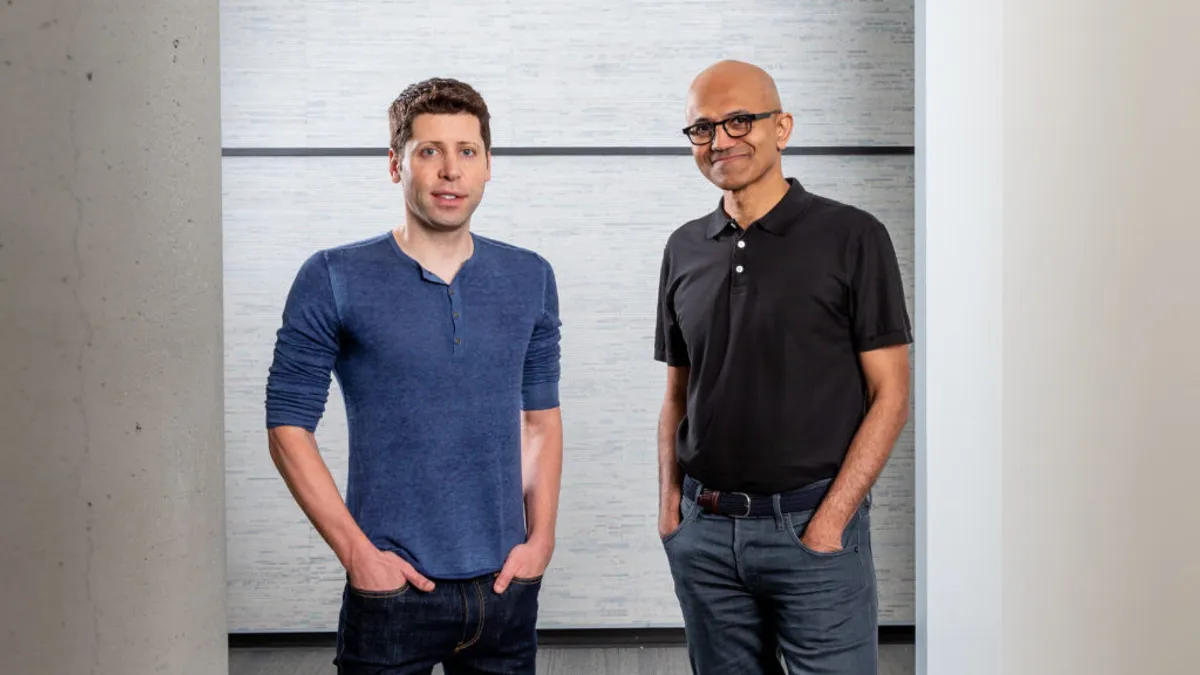Microsoft's $1 billion investment into a startup called OpenAI will get the two companies working together to "democratize AI — while always keeping AI safety front and center," according to Microsoft CEO Satya Nadella.
As part of a multiyear partnership announced on Monday, Microsoft and OpenAI will work on new Azure AI supercomputing capabilities.
The deal will also see OpenAI port its services to run exclusively on Microsoft Azure, while Microsoft will help OpenAI commercialize its technologies, a move analysts say holds potential for the future of Microsoft's cloud strategy.
Initially a non-profit, OpenAI was cofounded in 2015 by Elon Musk, Greg Brockman and Ilya Sutskever to take artificial general intelligence (AGI) — the idea that machines can perform the same tasks as humans — out of abstraction and into reality, while trying to limit its detrimental impact on humans.
To avoid potential conflict, Musk, CEO of SpaceX and Tesla, departed OpenAI's board last year as Tesla increased its focus on AI.
The startup sees the technology as a potential tool to fix multidisciplinary problems, like climate change and education.
"Our mission is to ensure that AGI technology benefits all of humanity, and we're working with Microsoft to build the supercomputing foundation on which we'll build AGI," Sam Altman, CEO of OpenAI, said in the announcement. "We believe it's crucial that AGI is deployed safely and securely and that its economic benefits are widely distributed."
Microsoft's cloud edge
For Microsoft, this latest play into the AI field reads as a sign of trust in the technology's capabilities, said Mike Gualtieri, VP and principal analyst at Forrester.
"Few technology companies, including AI researchers, have the courage to set a goal towards artificial general intelligence (AGI)," said Gualtieri in an email to CIO Dive. "That's because, although AI has made breakthrough advances since 2012 due to deep learning, most think AGI is decades away if possible at all."
That said, Microsoft stands to recoup part of its $1 billion bet on AGI through OpenAI's regular use of Azure, said Jud Waite, senior analyst at CB Insights, in an email to CIO Dive. In other words, Microsoft won't have to wait until AGI delivers on its ultimate promises to see returns.
"Those looking to access OpenAI's pre-AGI technology will do so through Microsoft," said Waite. "This partnership helps to further differentiate Microsoft's cloud services."
For context, the $1 billion investment number shouldn't be taken at face value until Microsoft reveals how it will be spent and what hurdles, if any, exist to releasing funds, Gualtieri said.
Even as demand for AI talent begins to level off, companies like Facebook, Apple, Google and Amazon join Microsoft in its interest in AI. The five companies have continuously been acquiring and investing in AI startups since 2012.
"Most AI researchers think full AGI is at least 50 years into the future," said Gualtieri. "In the meantime, even small breakthroughs can be harnessed by business to create efficiencies we haven't seen since the invention of the steam engine."












